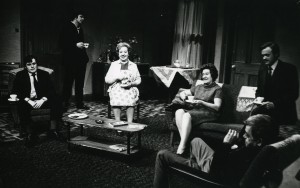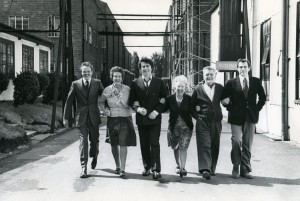On Saturday we had the opportunity to talk about the Lindsay Anderson Archive at a fantastic conference organised by the Scottish Word and Image Group at the University of Dundee. The conference examined the interdisciplinary relationship and crossovers between live performance, film and television and included a special event celebrating the work of Lindsay Anderson at the DCA.
Our paper was a collaboration with Prof. John Izod from our film studies department which looked at how Anderson directed David Storey’s play In Celebration on both stage and screen. Anderson had a long and fruitful working relationship with Storey. They first worked together when Anderson adapted Storey’s novel This Sporting Life for the screen in 1963. Over the next 30 years Anderson directed 9 of Storey’s plays including Home (1970), Early Days (1980) and Stages (1992). In Celebration was the first of Storey’s plays that Anderson directed. It opened at the Royal Court Theatre in London on 22nd April 1969 and proved to be a critical and commercial success. In a terraced northern house a miner Harry Shaw (Bill Owen) and his wife (Constance Chapman) welcome their sons home to celebrate their 40th wedding anniversary; but the reunion brings to the surface long-repressed tensions and conflicts which threaten to wreck the event. The father, last in a family of coal miners, has given everything to ensure that his sons escape the pit. However, the boys’ educational achievements have pushed them into worlds remote from their parents, and severed them from their roots. Andrew (Alan Bates), the ungovernable eldest, is a lawyer who has abandoned his profession to paint. Colin, the second (James Bolam), has risen to join middle management in a car factory. Meanwhile the youngest, Stephen (Brian Cox), is an introverted writer who, riven by unresolved family tensions, has suppressed his account of their youth.

Anderson and Storey returned to the play in 1974 to direct a film version for the American Film Theatre, a company which adapted plays to be shown in cinemas in the United States. In our talk Prof. Izod used Anderson’s production notes, correspondence and diaries to illuminate the process of transforming the theatrical into the cinematic. One of the key elements in the success of the film was Anderson’s insistence on reuniting the original cast of the 1969 Royal Court production for the film. Anderson noted that the actor’s performances had matured, partly because five years on they were closer to their characters’ ages, whereas some had been a little young for their roles in the original production. Their familiarity with the production also contributed to a sense of real family between them.

Saturday’s conference sessions were followed by a screening of Anderson’s film version of In Celebration at a packed DCA which was introduced by the actor Brian Cox. In Celebration was Cox’s first major film role and in an enlightening and entertaining Q&A session after the film he talked about the importance of the film in his career and his experiences working with Lindsay Anderson. He noted Anderson’s skill in getting the best out of his actors and he was struck, as were the audience, by how well the film stood up almost forty years after its original release. In the small claustrophobic sitting room of the family home the dramatic tension was built by the powerful performances of a cast led by a director who understood both the play and the actors, Cox referring to Anderson as “the best psychological director he’s ever worked with.”